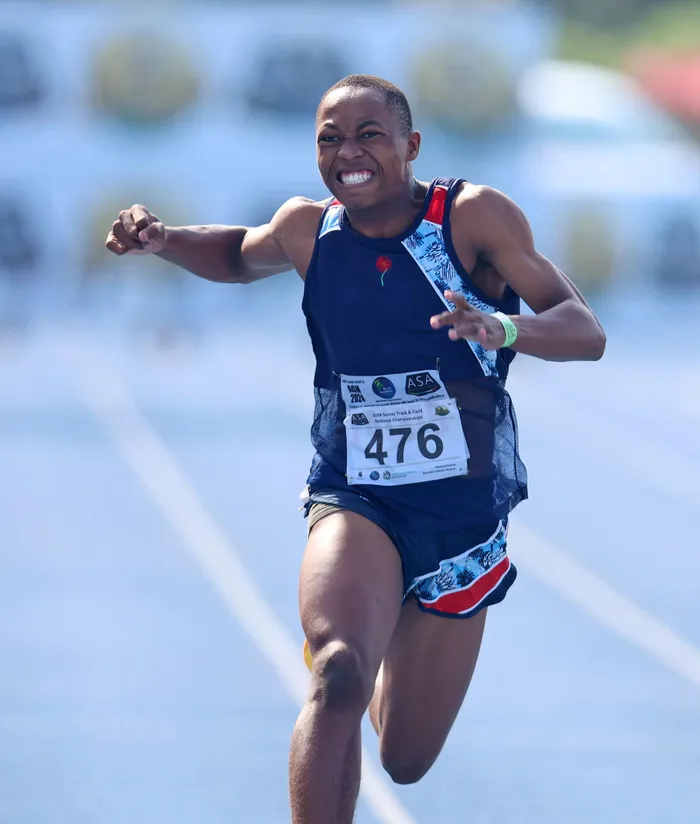'You gave me a chance, I ran with it' – teen Olympian pays it forward

His 100m personal best is 9.94 seconds, but Bayanda Walaza’s greatest leap was out of hopelessness.
Image: Backpagepix
I nearly didn’t make it, says star teenage sprinter Bayanda Walaza "I truly felt afraid of losing my future."
Bayanda Walaza, the world’s fastest teenager, remembers the moment when he overheard a conversation about what it would take to attend a top school that could nurture his sprinting talent.
"It hit me that no matter how hard I worked, without support I might not make it," says the 19-year-old. "I was in a place where I knew I had big dreams, but I didn’t quite know how to reach them. Mentally, I was determined, but sometimes it felt like the odds were stacked against me."
Everything changed when the Ruta Sechaba Foundation awarded Walaza a scholarship to attend Curro Hazeldean in Pretoria. Now, he’s paying it forward by leading the Foundation’s Nelson Mandela Day "I Funded A Future" campaign, rallying South Africans to help raise 67 donations and unlock a bonus scholarship for a learner in need.
After only weeks under coach Thabo Matebedi, Walaza was shaving tenths of a second off his 100m and 200m personal bests and winning gold in both events at the South Africa Under-20 Championships.
By August, the schoolboy had an Olympic silver medal around his neck as a member of South Africa’s 4x100m relay team in Paris, and in May this year he ran the 100m in a personal best of 9.94 sec, just twelve-hundredths of a second outside Akani Simbine’s national record.
Reflecting on his journey from a backyard shack in Katlehong, Ekurhuleni, to the pinnacle of youth athletics, Walaza remains a powerful voice in South African sport, inspiring the next generation as he champions access to education and opportunity.
"I was in a place where I knew I had big dreams, but I didn’t quite know how to reach them," he says. "Emotionally, I was hopeful but also anxious. Academically, I tried hard but it was tough without access to the right resources."
Walaza says the idea of a "world-class education" felt like something other children had – "something I would only see on TV or read about. It felt out of reach, like it belonged to a different world."
Wave of gratitude
Being awarded the scholarship changed that. "I’ll never forget that day. I was in total shock. For a second, I thought it might be a mistake. But then it sank in and I just felt this wave of gratitude."
The first person Walaza told was his mother, Tholiwe. "We hugged for a long time," he says. "I could see in her eyes that she knew life would be different now."
Walaza is one of more than 3 000 young people awarded Ruta Sechaba (Sesotho for "educating the nation") scholarships to Curro schools since 2016. Recipients are selected for their academic and sporting excellence, leadership potential and commitment to making a difference in their communities.
"The scholarship gave me confidence," says Walaza. "It showed me that people believed in my potential, even when I didn’t fully believe in it myself. It opened the door to a better future. I went from surviving to dreaming big.
"I started to believe that I could compete internationally – not just in sport but in life. It also made me realise that success is not just for certain people, it’s for anyone who is given a chance."
Walaza says it became clear that his personal good fortune represented something bigger when he visited his old primary school in Katlehong. "A young boy told me, “I want to run like you one day.” That moment hit me hard. I realised I’m not just running for me – I’m running for everyone who’s ever been told their dreams are too big."
Someone’s potential shouldn’t be limited by where they were born, he says. "Talent lives everywhere – in every street, every school, every family. All it needs is a chance.
"That donation could be the reason a future doctor, engineer or Olympian gets their start. It’s not about knowing us, it’s about believing in what’s possible."
After passing matric (with a distinction in isiZulu), Walaza now combines athletics with supply chain management studies at Tshwane University of Technology.
What would he say to someone who thinks their contribution to a Ruta Sechaba scholarship won’t make a difference? "I’d say, 'I am the difference your contribution made.' Even the smallest act of giving can change the entire direction of a young person’s life.
"I nearly didn’t make it, but I was given a chance and I ran with it – literally and figuratively."
• Donate to the Ruta Sechaba Foundation at https://rutasechaba.org/donate.
Related Topics: